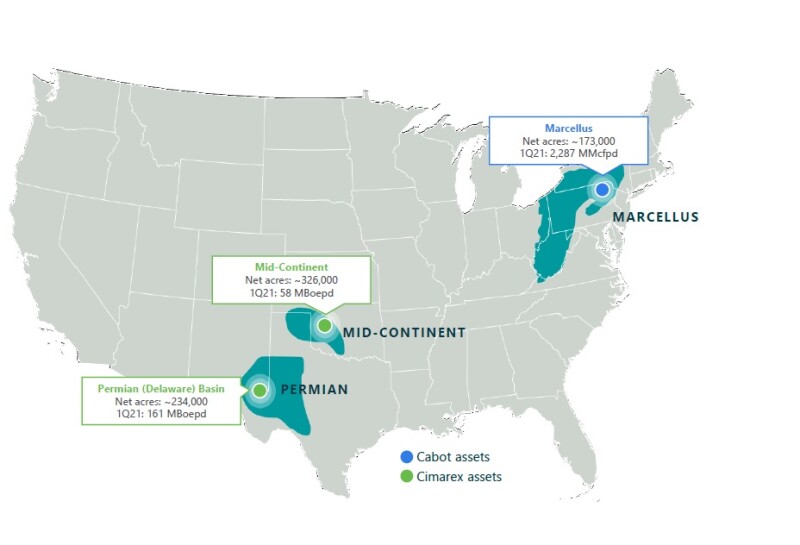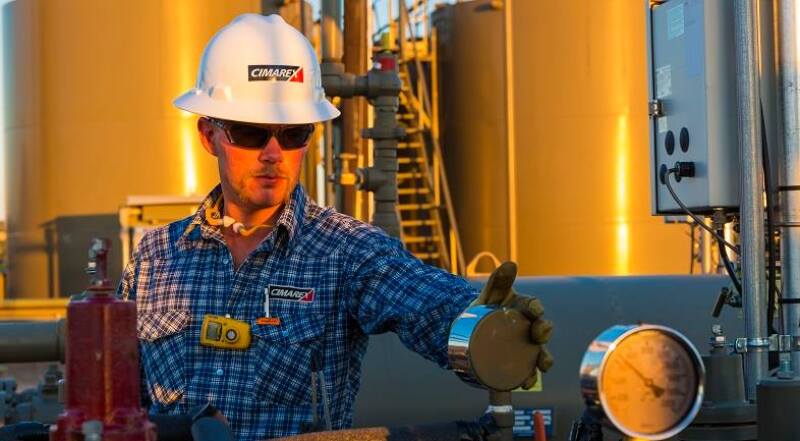US shale producers Cabot Oil & Gas and Cimarex Energy are the latest to declare a “merger of equals” in a deal valued at around $17 billion, based on recent equity prices. Announced today, the terms of the deal will result in Cimarex shareholders owning about 50.5% of the combined company and Cabot shareholders owning approximately 49.5%.
The deal brings together Houston-based Cabot’s gas-rich portfolio, comprising almost 173,000 acres in the Marcellus Shale, with Cimarex’s oil-dominated 560,000 net acres in the Permian Basin and Anadarko Basin. On a pro forma basis, the merged company will produce around 600,000 BOE/D from the three basins.
The companies expect $100 million in savings to materialize within 2 years of the deal closing and to generate around $4.7 billion in free cash flow from 2022 to 2024.
Dan Dinges, Cabot’s chairman and president, will assume the role of executive chair on the new company’s board. Thomas Jorden, chair and president of Denver-based Cimarex, will become the CEO and hold a board seat of the combined company that is to be headquartered in Houston.
Jorden acknowledged that the deal runs counter to other recent shale sector deals that have focused on consolidating assets in a single play. Speaking on a conference call with investors about the rationale for the merger, he said his view is that single-basin shale producers are especially vulnerable to what he called the “commodity roller coaster.”
“We like having diversity,” he added, explaining that his experience shows “having a good, diverse exposure to natural gas, natural gas liquids, and oil is the best way to play this. I know others see it differently, and that’s what makes this business fun.”
There are no firm plans for how the newly combined company will allocate capital amongst its three basins, but Jorden noted that increasing oil revenue from the Permian is likely to be an initial priority.
Further acquisitions were not ruled out by Jorden, who said, “If there are assets that are more valuable in our hands than they are in others', we’re going to jump at it.”

Other notable deals in the US shale sector in May include:
Oasis Petroleum completed a total divesture of its Permian Basin in an asset sale of up to $481 million to an unnamed buyer. The Houston-based shale producer said on 21 May that it will receive $406 million at closing, expected in June, and three annual payments of $25 million that are contingent on regional oil prices averaging over $60/bbl during each subsequent calendar year. Oasis previously sold two of its other small Permian assets. As a result, the operator will focus exclusively on its assets in the Williston Basin of North Dakota where it recently acquired 95,000 acres from Diamondback Energy for $745 million.
EQT Corporation said on 6 May that it was purchasing smaller rival Alta Resources in a cash and stock deal valued at $2.93 billion. Already the largest natural gas producer in the US, Pittsburgh-based EQT will add around 300,000 net acres in the Marcellus when the deal closes, which is expected sometime in the third quarter. The previous month, EQT purchased almost 4,100 net acres with 40 MMcfe/D of production from Reliance Marcellus for $69 million in southwest Pennsylvania.
Two mid-sized producers in Denver, Bonanza Creek Energy and Extraction Oil & Gas, will combine in an all-stock deal valued at around $2.6 billion. The companies said that the deal, announced 10 May, will result in the largest pure-play operator of Colorado’s Denver-Julesburg (DJ) Basin that is to be named Civitas. On a pro forma basis, the combined operator will control almost 425,000 of lease acreage in the unconventional play and average 117,000 BOE/D (based on first-quarter rates). Upon closing, expected in the third quarter, Civitas will commit to becoming a net-zero emitter (Scope 1 and Scope 2) through operational improvements and offset purchases. In April, Bonanza completed its acquisition of smaller DJ Basin producer HighPoint Resources, a deal that was announced in November.


